- Home
- Holly Black
Welcome to Bordertown Page 38
Welcome to Bordertown Read online
Page 38
I reminded the elf of this and of the occasional bursts of violence that had flared in the streets once people realized the Way had closed. It made people nervous, even after it reopened, as if the entire city had been under a spell of magic. “And we all know where magic comes from, don’t we?” I said. I stared hard until he looked away.
“You humans,” he said, but didn’t finish. Instead, he sighed and said, “If the money wasn’t enough for you, what is it you want?”
I looked back at the gleaming facade of his father’s mansion beyond his shoulder, smiled—no teeth, just upturned corners—and made my proposal.
* * *
Art and Lies. That’s what I got out of a night spent as an unwitting prostitute. I’d meant to save my dignity, go my own way, but after Mouse left I couldn’t save anything. No Mouse to bring home coffee and chocolate from his mysterious delivery service. No music to play for coins on a corner. Nothing left to trade for a roof and clothes and meals. It was either I collect on that spell-promised favor, or I join the Wharf Rats and start drinking from the Mad River.
The elf sealed our deal with magic this time: I got what I wanted, and he got a spellbound promise that I would never return, never bother him or his family again.
It was only after I’d walked away from Dragon’s Tooth Hill and back into Soho that I felt like I could release the breath I’d been holding.
When I moved from my apartment, I took the things Mouse had left behind and boxed them up. I stuck them in a corner of the crumbling Soho building the elf had restored for me. It was on Carmine Street, where I knew people, and I put up flyers advertising what I intended the place to be. People responded by bringing me paperbacks with dog-eared pages, CDs in plastic cases, vinyl records lurking in the corners of their attics, VHS tapes, VCRs covered in dust, flimsy comic books, paintings and sculptures from local artists. I paid for the used items and arranged for the art to be sold on consignment. A bit for me, a bit for the makers. Then I hung my sign in the window and pretended to be proud when people who knew me as a street violinist rang the bell over the door as they entered for the first time, smiling, congratulating me on my new venture.
And then, three weeks ago, I turned at the sound of that bell to see him come in, looking around cautiously as he stepped up to the counter, where I’d been pricing a set of semitattered books about teenaged love-crazed vampires someone had brought in. Alek, Aleksander, Mouse.
I didn’t waste any time asking how he’d been or what he’d been up to. I just went to the back room to collect his box of left-behind things. When I pushed it across the counter, he said, “It’s good to see you doing so well, Marius. Your place, it’s really impressive.”
“Thanks,” I said, and tapped my finger against the counter.
“Don’t you want to know how I’ve been?” he asked.
I could only shake my head.
“Then you don’t want to know what’s going to happen soon? Not far from here?” he asked.
I looked up, frowning. “Please say what you came to say.”
“We’re going to take it,” he said. “We’re going to take that bleeding Oberon House by storm, and then burn it to the ground.”
“You’ve been drinking Mad River water,” I told him. “You have no idea what you’re saying. There are children in there,” I added through clenched teeth.
“I know what I’m saying,” he said. “I know what I’m doing, Marius. We have a plan. We’re going to take the building first, then burn it down after we get the kids out, so those bastards know they can’t abuse us any longer.”
“You’ll be killed,” I said. “It’s not possible. They’re too powerful.”
“We’re powerful, too, Marius. You’ve always underestimated us. Underestimated yourself.”
“I could turn you in to one of the elf gangs,” I said, hoping that the threat would scare him off his plans. “I could warn the Silver Suits.”
“You won’t, though,” said Mouse. “I know you, Marius.”
“No,” I said, “you don’t, actually.” Then: “Why are you telling me all this?”
“So you can tell others,” he said. “Afterward, when it’s over, we’ll need a song, like all important battles and revolutions have. So people will know what was meant by it. You should be the person who does that.”
“You shouldn’t count on me for that,” I said. “I don’t want anything to do with your schemes.”
“They’re not schemes,” said Mouse. “They’re acts of justice. It was you who first taught me I couldn’t trust them. Why are you trying to defend them? They wouldn’t do the same for you.”
My mouth dropped open for a long moment. Now I was at the root of his crazed revolution. “Stop,” I said. “I don’t want to hear any more.”
He stood in the doorway holding his box of things, looking around the place with a squint in his eye. “It speaks volumes about you, Marius, this place. But I’m not sure you know that, do you?”
“Please leave,” I said.
And he did leave, as soon as I turned away. I knew by the sound of the bell.
* * *
Tonight I waited in a doorway across the street from that shabby building his group had holed themselves up in, watching their silhouettes pass by windows, Mouse and his new friends. I couldn’t help myself, I couldn’t make myself go home. And later, after nearly two hours had passed, I watched the lights in the building go off, floor by floor. Then the door they’d gone through opened, and the same group of kids spilled out again. I pressed myself into the shadows of my alcove and gasped when I saw the full backpacks slung over their shoulders, cans of gasoline in their hands, bricks clenched in their fists, baseball bats, trash can lids buckled across their arms like shields. They were going to do it after all. They were going to do what he’d said.
I stood there, unable to move. What could I say? What could I do? I couldn’t bring myself to go to the Silver Suits about it. It wasn’t just elves I distrusted. And anyway, I reasoned, they’ll be caught. Surely they can’t walk into Oberon House, take out the Truebloods running the place, and burn the place down. It would never happen.
I thought about going home, doing my best to pretend I hadn’t seen anything. But even after I was halfway home, I found myself turning around, going back the way I’d come, back to Hell Street, then north to Ho, the street I’d seen Mouse and his gang go down. There were my feet, taking me to him as usual.
By the time I was a block from Oberon House, I knew I was already late to their party. Shouts and screams filled the air. Gunshots and spellblasts sounded off at random intervals. The scent of smoke reached me before I walked into a fine cloud of ash and found a mob moving down the street toward me; and at their backs, Oberon House loomed, smoking, creaking, tufts of fire eating the windows. Sirens wailed. Silver Suits were arriving. Truebloods and humans and halfies stood in the streets, some fighting, some looking up at Oberon House as it burned. The voice of the mob boomed above the smoke and fire: “We do not come in peace! We do not come in peace! We do not come in peace!” as they marched toward me, fists pumping in the air.
I put my face in my hands. What have you done, Mouse? I thought. And then: What did I do by letting you?
I looked out at the mob through the spaces between my fingers and dropped my hands. There he was, at the head of the pack, his face smudged with ash, a bloody gash across his forehead. He’s done it, I thought, and for some reason I laughed, only a little at first, then full on, like someone whose life has been changed by a tremendous tragedy or a miracle in an instant.
As the mob approached, I heard a faint whistling come from above me, as if a bird were perched somewhere overhead. No bird flew by when I looked up, though. Only the music. Only the music flew overhead, sifting through the smoke, waiting for me to take it, to shape it, if I would.
I’m not sure I’ve ever moved so fast as I did right then, taking my case from under my arm to release my violin. I stood there for a second and list
ened to what the music was trying to tell me, then I tried to play it—no, let myself play it—a song for Mouse, for Aleksander, the Voice of the Nameless, who stopped when he saw me and ran across the street to join me, while the mob marched on without him.
“Thank you,” he said, after I finished my song for him, after I took the violin down and looked at his soot-smudged face and laughed at him, shaking my head.
“You’re crazy,” I said.
He only smiled and shrugged. “Seems like I have to go to extremes to get your attention. I knew you would come through for me, Marius.”
“Well, I certainly didn’t.”
“I knew,” he said, and put his hand on my shoulder where the violin had rested, pulled me down so he could kiss me.
I could turn you in to one of the elf gangs, I’d told him that day in the shop.
You won’t, though, he’d said. I know you, Marius.
No, I’d said, you don’t, actually.
But perhaps, to my surprise, he did.
A BORDERLAND JUMP-ROPE RHYME
BY JANE YOLEN
Translator’s note: “Sweet Mistress Mab” is a fairy jump-rope rhyme. Playing with jump ropes—or skip ropes, as they are sometimes called by the Truebloods—is something the fairy children in Borderland have borrowed from their human counterparts. Their rhymes are often patterned after the human rhymes. For example, the following closely follows the rhythm of “Miss Mary Mack,” a popular human jumping rhyme. But it does not have the silly nonsense of that rhyme. Instead it begins with something akin to a murder or a mob hit and ends with a warning.
—Durocher, L., and Sharpe, Mary Elizabeth
The Streets of Bordertown: A Festschrift
Iowa City: University of Iowa Press
Sweet Mistress Mab, Mab, Mab
Lies on a slab, slab, slab.
Her silver eyes, eyes, eyes
I want to jab, jab, jab.
She is not dead, dead, dead,
Just dressed in red, red, red,
With thirteen rounds, rounds, rounds
Inside her head, head, head.
If they are iron, iron, iron
Instead of lead, lead, lead,
Then she will sure, sure, sure
Be very dead, dead, dead.
If silver made, made, made
She’ll be afraid, ’fraid, ’fraid
And in a trice, trice, trice
She’ll start to fade, fade, fade.
Oh humans all, all, all
Pray heed my call, call, call.
Don’t put a fey, fey, fey
Against the wall, wall, wall.
For if you do, do, do
And death’s not true, true, true,
Then watch your back, back, back.
We’re after you, you, you!
THE ROWAN GENTLEMAN
BY HOLLY BLACK AND CASSANDRA CLARE
Ashley watches Renata take a last deep drag and then stub out her comfrey cigarette on her dressing table. It’s already covered in spilled glitter, matches, paint, and the burned craters from other cigarettes. Ashley can hardly remember the fine wooden vanity Renata found on the street and dragged back to the Magic Lantern. It’s suffered a lot since then.
“Open the box already,” Renata says, pulling a lip liner from one of the drawers.
On the wall, a cracked mosaic of mirror fragments reveals Ashley’s face, filled with trepidation.
The Magic Lantern was one of the first places Ashley came to when she arrived in Bordertown. She’d sit in the back and watch whatever was playing or doze because she was sure she’d be safe. Once Alain Bach Glaimhin took over from O’Malley and started casting for simultaneous live shows, Ashley knew that she wanted to be on that stage more than anything.
Ashley loves working at the Magic Lantern. Her hands hesitate over the ribbon on the large package, the one woven with sprigs of rosemary and ragwort. She knows the more gifts Alain gives her, the closer she is to being asked to leave.
“He really likes you,” says Renata.
“Alain?” Ashley laughs. “No, he just likes the chase. It gives him something to do when he’s not lying around on that scroungy old sofa like—” She was going to say “a prince in a fairy tale,” but realizes how silly that sounds, considering what Alain is. She yanks at the ribbon instead, and as it comes apart, the box comes apart cleverly, too, shedding glittering petals. Inside is a folded length of fabric.
She picks it up and it unrolls in her hands: a scarf, ice-white, as light as cobwebs and spangled here and there with bits of shimmer—not as light as sequins or as heavy as actual jewels, they are like bits of trapped light, like the sun sparking off an icicle.
“Ooh,” says Renata. “Pretty.”
Of course it’s pretty—everything Alain gives her is pretty. Elves are incapable of giving ugly presents; it offends their sense of aesthetics. Ashley’s cheap, mostly bare room in the crash space she shares with most of the other actors at the Magic Lantern is filled with pretty things Alain has given her: silk slippers too delicate to actually wear, a brooch that seems to trap the colors of the Mad River inside it, a starlike prism that fills her room with rainbows.
Someday he will ask to be given something in return for all these presents. Perhaps her heart or maybe the rest of her—possibly both.
“I shouldn’t keep it,” Ashley says, although she knows she will. She sets the box aside and starts to slick back her short black hair so that none of it will be visible underneath her long, honey-brown wig. It’s not dress rehearsal yet, but Ashley has learned from experience that wigs take more than one performance to get used to.
“You can’t. There’s probably a serious violation of elfin custom—maybe even a deadly insult.” Renata smiles as she spreads lipstick over her already bright mouth. “Besides, Alain is so cheap! You see that new tech guy? He’s so clearly detoxing from the Mad River water. You can smell it when he sweats. Alain never hires anyone but addicts, criminals, and weirdos. You, my dear, are his one indulgence.”
An indulgence. It is strange to be thought of that way. Alain certainly doesn’t spend his money (and Ashley knows he has to have quite a lot, since he comes from one of those fancy Trueblood families with their big houses up on Dragon’s Tooth Hill) on the Magic Lantern. She isn’t even entirely sure why he bought it—maybe some kind of misbegotten rebellion against his seldom-mentioned father. The dingy glamour of the Magic Lantern is a far cry from the highborn elegance of the Truebloods.
It’s the only place in town that even tries to show movies. With Bordertown’s electricity being the way it is, the film projectors only work about half the time, even with spellboxes in place. So that the stories won’t be interrupted, Alain employs a cast of real-life actors who act out the movies as they take place, in front of the screen, and whose performances continue in the event of electricity failure. Over the months, along with presents, Alain has given Ashley some of the best parts. She’s been Mia from Pulp Fiction, Lara from Dr. Zhivago, and Thelma from Thelma and Louise.
The troupe acted the same pieces over and over, because those are the film reels they were able to obtain, but with the Way reopened, there’s a flood of new material. The Matrix. Titanic. The new set of Star Wars movies (though no one likes those). And Lord of the Rings, which Alain seems to think is a comedy. For their first new production, he picked one called Pirates of the Caribbean, though why an elf would be a fan of a film based on a theme park ride is unclear.
When Ashley and Renata get to the stage, the rest of the cast is already there, looking at the screen with awe. There’s a flood of new technology, too. One of the tech guys must have gotten the little machine that played shining silver disks to finally work. Waves crash against the hull of a ship, and the arm of a monstrous octopus twists toward it, suckers undulating. The actors gasp in unison.
Kit, who plays nearly all of the leading male roles because of his square jaw and long legs, spots Ashley. He waves her over. “It’s going to be a good sh
ow,” he says, bouncing from one foot to another with barely contained glee. “But I wish I was playing Jack. He gets all the best lines.”
“But not the girl,” Ashley says with a small smile. They kissed a few times in front of a packed house when she played Thelma and he played the hitchhiking thief, so she figures it’s okay to flirt with him. Kissing sets a precedent.
Besides, he’s never given her a thing.
“There’s a sequel,” says Kit easily.
Ashley glances toward the wings of the stage, where Alain reclines on a scavenged couch, beautiful in a way no human can be beautiful. His eyes are barely open. He dozes, barely seeming to register when the movie finishes. At first she thought he didn’t care when she flirted with other people in front of him; now she realizes he doesn’t even notice.
Alain looks like what he is—a highborn elf slumming until he gets bored with human things and moves back to the Realm to do whatever it is that elves do there. Ashley likes Alain. He is good-humored, for an elf. Nothing ever bothers him much. He’s beautiful, he gives her good parts, and he sleeps a lot—like a cat. She likes him, but she doesn’t respect him. It’s hard to respect someone who doesn’t care about anything. Even the way he courts her is lazy.
Alain waves an arm languidly from the couch. “Go on, then,” he says. “Rehearse. Only five days until opening night.” He yawns and closes his eyes again.
“Inspiring,” mutters Renata.
They take their places on the stage. They are rehearsing the scene where Elizabeth, Ashley’s character, is saved from drowning by Jack. The ocean is represented by a blue circle painted on the floor. Ashley pretends to gasp and tumble into it, and is hauled out by Nat, the skinny teenager to whom Alain has inexplicably given the role of the pirate captain. His wig of multiple black braids has slipped to one side, and his eyeliner is smeared. He presses down hard on Ashley’s chest, pretending to revive her.

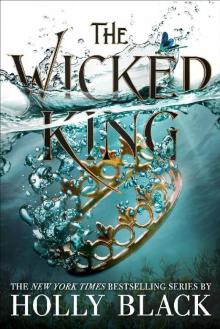 The Wicked King (The Folk of the Air #2)
The Wicked King (The Folk of the Air #2)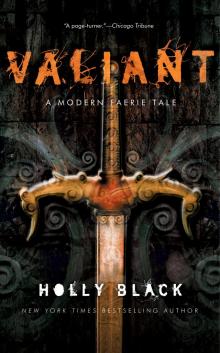 Valiant
Valiant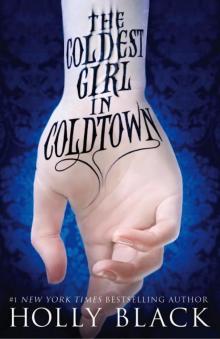 The Coldest Girl in Coldtown
The Coldest Girl in Coldtown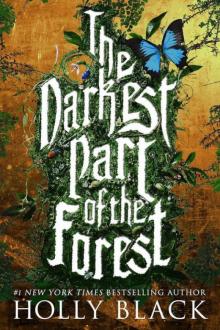 The Darkest Part of the Forest
The Darkest Part of the Forest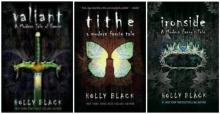 Tithe
Tithe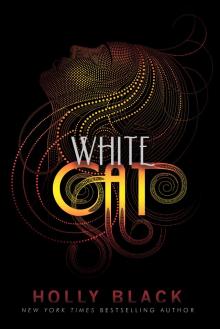 White Cat
White Cat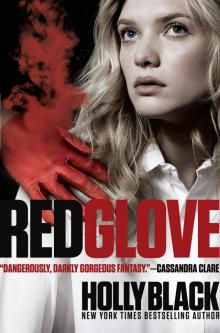 Red Glove
Red Glove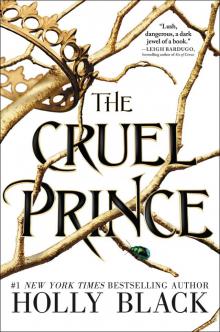 The Cruel Prince
The Cruel Prince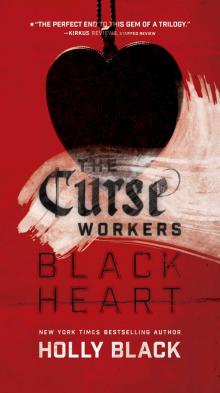 Black Heart
Black Heart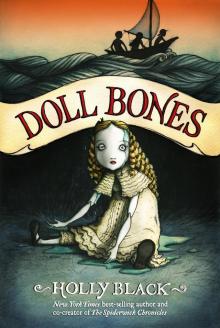 Doll Bones
Doll Bones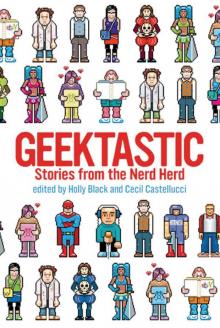 Geektastic: Stories from the Nerd Herd
Geektastic: Stories from the Nerd Herd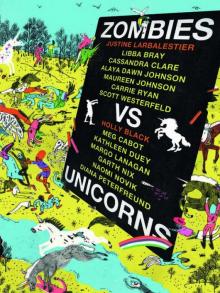 Zombies Vs. Unicorns
Zombies Vs. Unicorns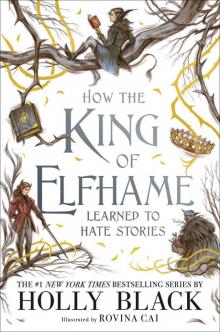 How the King of Elfhame Learned to Hate Stories
How the King of Elfhame Learned to Hate Stories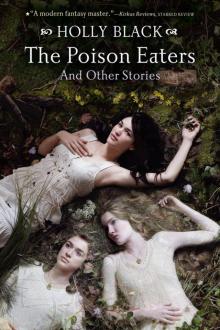 The Poison Eaters and Other Stories
The Poison Eaters and Other Stories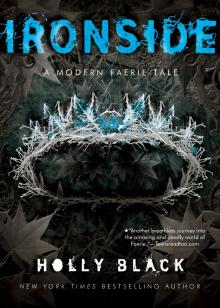 Ironside
Ironside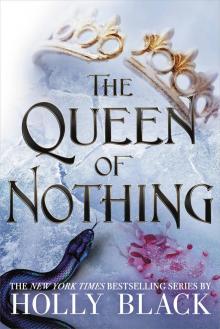 The Queen of Nothing
The Queen of Nothing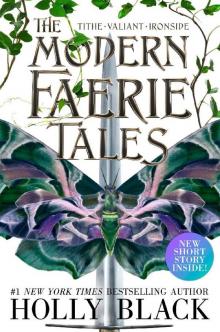 Modern Faerie Tales
Modern Faerie Tales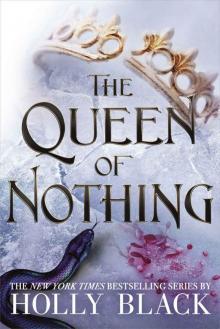 The Queen of Nothing (The Folk of the Air #3)
The Queen of Nothing (The Folk of the Air #3)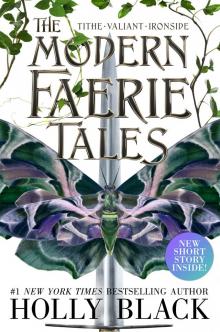 The Modern Faerie Tales
The Modern Faerie Tales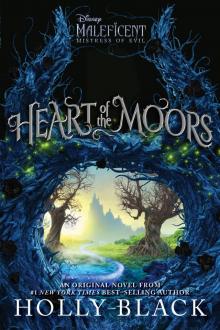 Heart of the Moors
Heart of the Moors The Golden Tower
The Golden Tower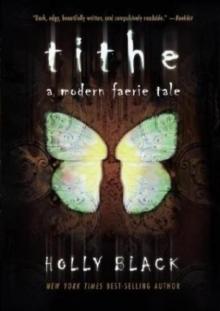 Tithe mtof-1
Tithe mtof-1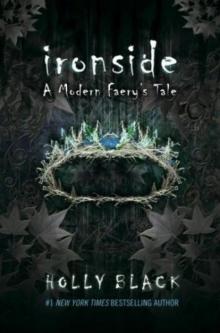 Ironside mtof-3
Ironside mtof-3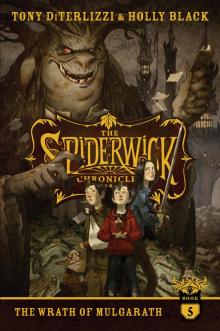 The Wrath of Mulgarath
The Wrath of Mulgarath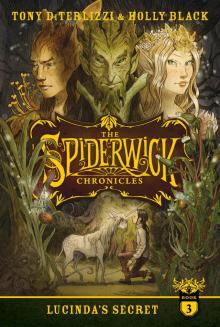 Lucinda's Secret
Lucinda's Secret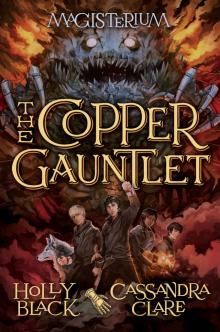 The Copper Gauntlet
The Copper Gauntlet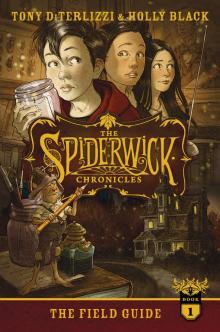 The Field Guide
The Field Guide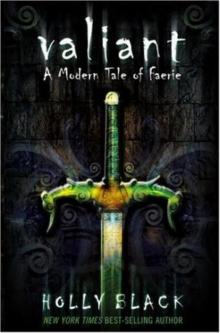 Valiant mtof-2
Valiant mtof-2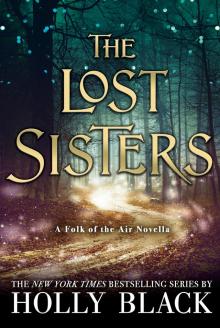 The Lost Sisters
The Lost Sisters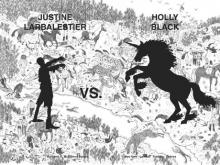 Zombies vs. Unicorns
Zombies vs. Unicorns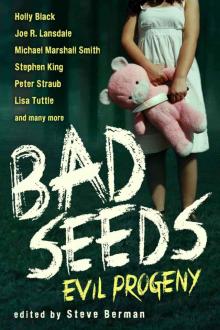 Bad Seeds: Evil Progeny
Bad Seeds: Evil Progeny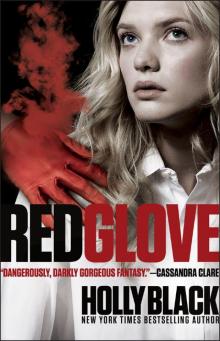 Red Glove (2)
Red Glove (2)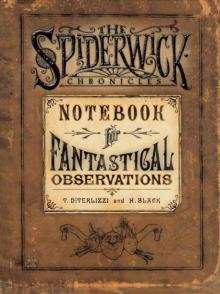 Notebook for Fantastical Observations
Notebook for Fantastical Observations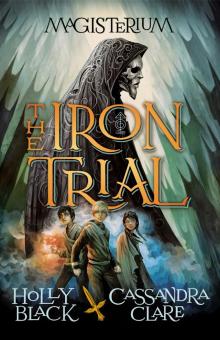 The Iron Trial
The Iron Trial Welcome to Bordertown
Welcome to Bordertown